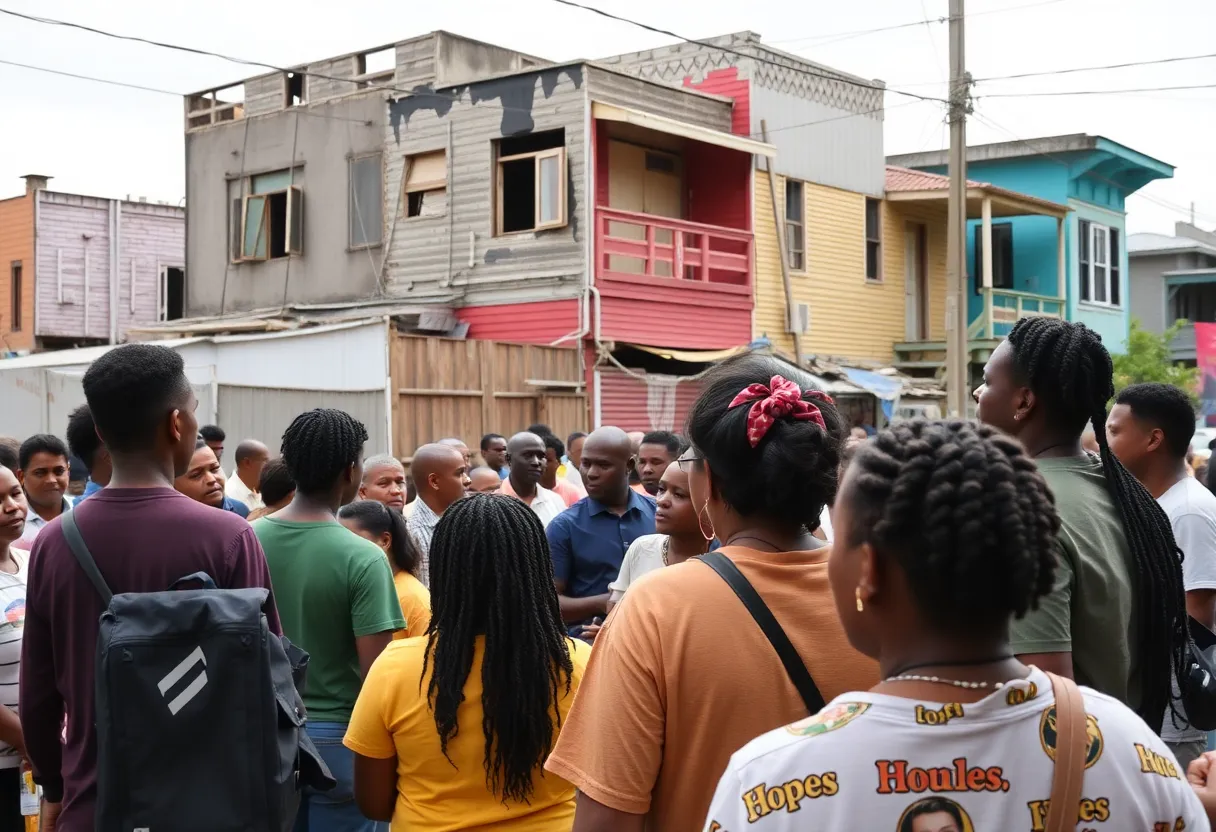News Summary
Two decades after Hurricane Katrina, New Orleans, especially the Lower Ninth Ward, continues to face significant challenges in recovery. The storm, which resulted in numerous fatalities and extensive damage, has left Black residents grappling with systemic injustices and inadequate support. With a declining population and ongoing emotional and physical challenges, community leaders emphasize the need for focused efforts to address these disparities and promote resilience in the face of adversity.
New Orleans
Twenty years after Hurricane Katrina devastated New Orleans, particularly impacting the historically Black Lower Ninth Ward, the community continues to grapple with the aftermath of the storm. Hurricane Katrina, which struck on August 29, 2005, was a Category 3 hurricane that led to over 1,800 fatalities and generated approximately $120 billion in recovery aid. However, many Black residents in the area still face significant challenges stemming from their initial response and subsequent recovery efforts.
Evacuation for many residents during Hurricane Katrina was fraught with difficulties. Resources were limited, and systemic support was lacking, disproportionately affecting Black families. This reality has since contributed to a long-term struggle for stability and security within the community. Two ministers from the Lower Ninth Ward noted that the recovery process has neglected Black communities, emphasizing that assurances made following the storm have largely gone unfulfilled. They pointed to the inadequate repairs of levees as a significant oversight that continues to put lives at risk.
Many residents in the Lower Ninth Ward still deal with a range of emotional and physical challenges resulting from the hurricane. The reoccurrence of floods in areas which had previously remained safe further exacerbates feelings of insecurity among the population. The aftermath of the storm has also led to a dramatic decline in the Black population of New Orleans, which has decreased by over 121,000 residents from 2005 to the present, dropping from 67% of the city’s overall population to 58%.
Displacement and Recovery Challenges
The path to recovery has been complicated by systemic injustices and inadequacies in federal aid. Many community members believe that assistance did not adequately address the educational and infrastructure needs crucial to rebuilding Black neighborhoods. Following Hurricane Katrina, privately managed charter schools were introduced to the public education landscape. However, funding for local schools has often fallen short, with only one school, Martin Luther King Jr. Elementary, reopening in the Lower Ninth Ward despite nearly $2 billion allocated for school rebuilds.
The Lower Ninth Ward continues to experience a growing sense of disconnection as few resources return to the neighborhood. This lack of essential services has contributed to a pervasive atmosphere of despair and dislocation, forcing residents to confront issues of gentrification that overlook the rich historical context of Black culture in New Orleans.
The Ongoing Struggles and Resilience
As the struggles persist, residents reflect on their experiences of trauma, coping with mental health issues linked to loss, displacement, and ongoing economic instability. In response to these challenges, various activist organizations have emerged within the community, offering mental health support and advocating for systemic changes to address the lingering impacts of past traumas. Despite these ongoing struggles, leaders remain determined to uphold their faith and support the recovery of their community.
Legacy of Hurricane Katrina
The legacy of Hurricane Katrina continues to shape contemporary issues within the community, leading to conversations about economic instability, public safety, environmental vulnerabilities, and the preservation of Black culture. While the fight for a fully equitable recovery has been arduous, efforts persist to honor the resilience of those affected and advocate for a more just future in New Orleans.
The ongoing reflection on Hurricane Katrina serves as a critical reminder of the disparities faced by Black communities and the importance of concerted efforts to ensure their recovery and resilience in the years to come.
Deeper Dive: News & Info About This Topic
HERE Resources
Today’s Top New Orleans News: What to Know
This Week’s Best Events in New Orleans
New Orleans Entertainment Guide: Live Music, Theater & More
Federal and State Agreement to Restore MRGO Wetlands
Louisiana Oyster Task Force Meeting to Address Industry Challenges
New Orleans Commemorates 20th Anniversary of Hurricane Katrina
Ray Nagin Reflects on Hurricane Katrina’s Aftermath
Mayor LaToya Cantrell Indicted on Multiple Felony Charges
New Orleans Residents Reflect on Cultural Resilience and Identity
The Lingering Impact of Hurricane Katrina on New Orleans
Additional Resources
- Afro: New Orleans Lower Ninth Ward and Katrina
- The Root: Heroes of Katrina
- Mother Jones: Hurricane Katrina Mental Health Crisis
- Newsweek: Hurricane Katrina Race Against Time
- Essence: New Orleans Learned to Fly
- Wikipedia: Hurricane Katrina
- Encyclopedia Britannica: Hurricane Katrina
- Google Search: Hurricane Katrina impact on New Orleans

Author: STAFF HERE NEWORLEANS WRITER
The NEW ORLEANS STAFF WRITER represents the experienced team at HERENewOrleans.com, your go-to source for actionable local news and information in New Orleans, Orleans Parish, and beyond. Specializing in "news you can use," we cover essential topics like product reviews for personal and business needs, local business directories, politics, real estate trends, neighborhood insights, and state news affecting the area—with deep expertise drawn from years of dedicated reporting and strong community input, including local press releases and business updates. We deliver top reporting on high-value events such as French Quarter Festival, New Orleans Jazz & Heritage Festival, and Essence Music Festival. Our coverage extends to key organizations like the New Orleans Chamber of Commerce and Greater New Orleans, Inc., plus leading businesses in energy, healthcare, and education that power the local economy such as Entergy, Ochsner Health, and Tulane University. As part of the broader HERE network, including HEREShreveport.com, we provide comprehensive, credible insights into Louisiana's dynamic landscape.

